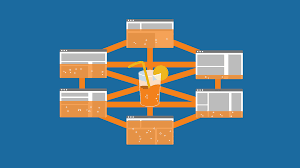In his reply to a tweet from September 2022, the infamous John Mueller said: “anything that talks about link juice should be ignored.”
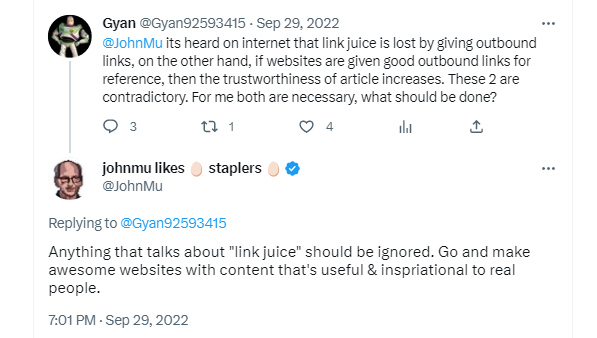
Despite John’s stance, SEOs still discuss link juice (or link equity). In fact, experts pitch it as a crucial element of ranking and a direct benefit of internal linking.
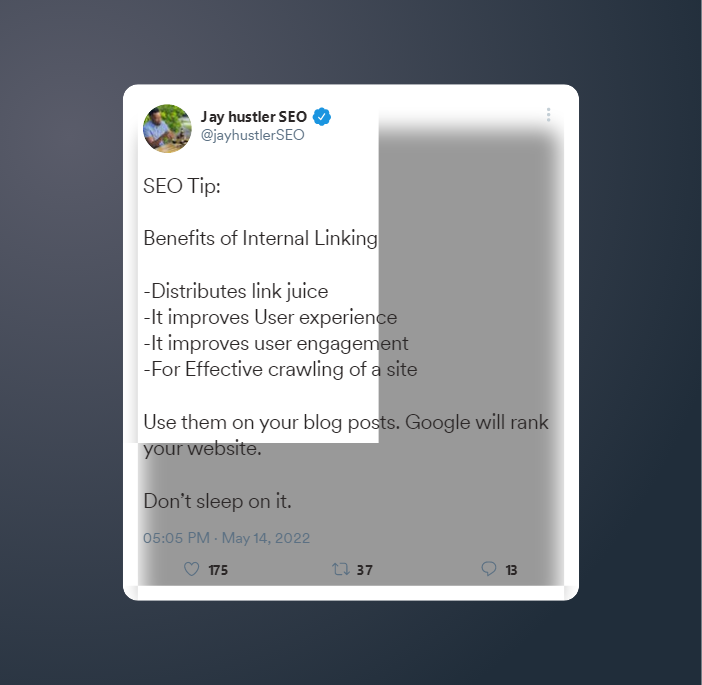
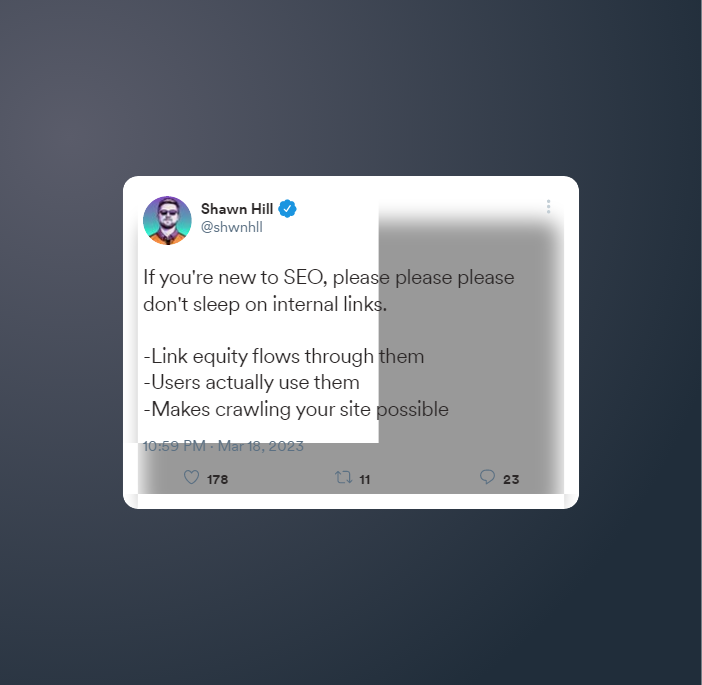
Maybe posts about link juice shouldn’t be ignored after all. Rand Fishkin, Co-founder of Moz, agrees!

Before we get reeled into all the debate about “link juice,” what does the phrase even mean?
More importantly, how does it work?
Let’s find out!
What Is Link Juice? Understanding The Basics
Link Juice is all but a corny slang for “link equity.” Some even said it is the worst slang ever in the SEO world.
Opinions about the choice of words aside, link juice/equity means passing value and authority (collectively juice or equity) down from one page/site to another (the one at the receiving end).
How so?
When a site/page sends a backlink to a content/page, it means the latter is valuable. Search engine bots will count that backlink as a vote and rank the “content/page” higher on search results.
In other words, your cup will be filled if you gather enough juice from several pages/sites. And a “filled cup” will always be more valuable than half-full or empty cups.
Still confused despite the analog?
Check out how link juice works below!
How Does Link Juice Work?
Already, we discussed that juice passes down from one site to another in the form of value and authority. That much remains true.
However, the whole process happens in stages.
- Stage 1: A page on site “A” accumulates link juice by the number of backlinks it receives
- Stage 2: Now, that page will send links to other another site “B”
- Stage 3: site “B” will then spread the juice to all its money pages to build their authority.
Here’s what we explained earlier, but in a visual representation:
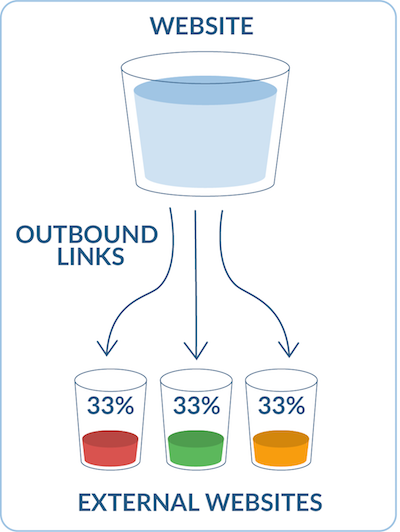
Source: Woorank
Is Link Juice And PageRank The Same?
Short answer: no!
Link juice focuses on how value is passed down from one page/site to another. Moreso, the term (link juice or equity) is not recognized by Google. It is all but fancy slang among SEOs.
PageRank, on the other hand, is a Google ranking metric. It focuses on the backlink profile of a page/site.
Pre-2016, PageRank was the primary ranking factor for sites to get seen on search results. However, it is now only one of many factors.
Fun fact: PageRank was named after Larry Page, Google’s co-founder.
Despite the differences, link juice and PageRank are somewhat related. Here is how:
The higher the PageRank of a page/site, the more juice it can pass down. And vice versa.
Outside that “single” similarity, link juice/equity is not the same as PageRank. So, don’t use the terms interchangeably.
Note:
You won’t find PageRank on Google’s toolbar anymore. However, Ahrefs’ UR and Moz’s PA are great alternatives.
Now, let’s answer the most critical question of all.
Should You Ignore Link Juice?
Going back to what John Mueller said about ignoring link juice. He was replying on what the guy should focus on. And that is writing valuable content.
Valuable content, on the other hand, does one thing: it attracts backlinks. The backlinks would then pass ranking juice to your page.
In essence, don’t ignore link juice. Leverage it for your money pages and sites.
Besides, Google ranking works with the “link juice” you were advised to ignore. Here is how:
If two different pages are well-optimized for a keyword — say, personal injury lawyer, Las Vegas. Maybe the two sites even scored 90/100 on Surfer.
However, say “page A” receives link juice from 4 websites while “page B” receives only from 3.
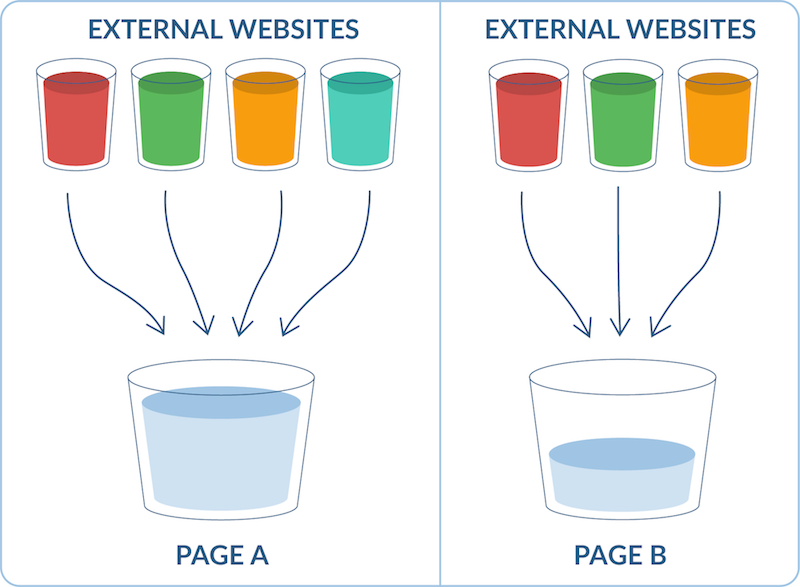
Source: Woorank
Deductively, from the illustration, “page A” will rank higher on search results than “page B.”
Now, we have established the importance of link juice. Let’s show you how to send more juice to your site.
Adding More Juice/Equity To Your Web Pages
There are several ways to add more link juice to your site. However, the 5 methods listed below are the easiest.
- External links
- Internal links
- Redirects
- Link reclamation
- Outreach
External Links
Undoubtedly, the first and most effective way to send juice to your website is through backlink — from an external, authority, high-traffic page/site.
However, getting other websites to link to your pages can be tricky. How so?
The low authority sites will EASILY send backlinks. Unfortunately, link juice is not just a game of numbers. It also considers the quality of the website sending the links.
In other words, only high-quality backlinks (and juice) counts.
So, what should you do?
Use trusted methods that get backlinks from high-quality sources.
- Guest posts — give you complete control over the articles to write and the page to send the juice to.
- Linkable assets — are similar to guest posts, but you don’t get to dictate where the juice flows to. The reason for that is before the backlinks here are earned.
- Niche edits — can send link juice to a specific page on your website. Unlike guest posts, you won’t write the posts. Instead, you will pay the authors or site owners to insert a link in their high-performing articles.
Pro tip:
Be careful using niche edits. Otherwise, you could be penalized by Google for paying for backlinks.
Internal Links
The chances are that your linkable assets won’t be your money pages. Take Ahrefs Backlink Checker as an example. It has a unique URL and only discusses subscriptions after a free use.
In other words, guests will get value but wouldn’t necessarily buy anything from Ahrefs.
Imagine that!
What if you don’t even have a linkable asset? What if a random post attracts the most traffic to your site?
Can you convert such traffic to sales?
Short answer: yes, but only with internal links. How so?
Say you wrote an “ultimate guide on how to build link juice.” Undoubtedly, that article will get backlinks even when you don’t try.
Now, you’ll use internal links to connect “the article” to your money pages.
And so?
You just successfully sent link juice to your money pages via internal links.
Note:
While internal link building might seem easy, it is hectic. You must identify the pages on your site with the most authority (i.e., backlinks).
GOOD NEWS: Ahrefs or even Semrush can help. The tools will reveal the pages with the most authority and backlinks.
Now, you can distribute the link juice as you see fit. However, prioritize the distribution. Send juice to money pages needing it the most first.
Redirects
Redirects are unique forms of internal linking. But unlike the latter, the former requires that a page is deleted.
Huh?
Yes, you’d delete one of your web pages. After, you’d set up a 301 redirect that funnels the juice of the deleted page to a new one.
In other words, you are sacrificing the juice of a page for another.
So, how can you go about this method?
- First, find relevant pages — old pages will be the best choice
- Ensure that the pages are not at the top of the pile on your site for most traffic or conversions
- Most importantly, ensure that the pages won’t benefit from content updates or overhaul
- Now, redirect the pages that meet the criteria to your new pages
Link Reclamation
If you delete a page with a few backlinks, you can reclaim the link juice. The process of doing that is called “link reclamation.”
So, how does this method work?
- First, login into your Google Search Console page. Check the Index Coverage report for 404 status URLs.
- Now, use Ahrefs to find the backlinks leading to the 404 pages.
- Contact the sources of the backlinks and provide them with an updated URL.
While you are at it, never redirect the 404 pages to your homepage or money pages. Otherwise, you will reduce search bots’ evaluation of your authority.
Pro tip:
Link reclamation can be used to claim competitors’ old links. You only need to create a replacement page for the 404 pages. And the link juice can be yours.
Read more: How To Use Broken Link Building!
Outreach
This method works best when you have a linkbait. A link bait could be a linkable asset, replacement page, or skyscraper content.
When the baits are ready, pitch them to relevant writers, authors, and site owners. Then, watch them (writers and their bands) be enticed.
Here’s a heads-up: outreach can be hectic because you’re dealing with humans. Your messages might never be opened in months, let alone getting a response.
Regardless, keep at it. More importantly, ensure your pitches are personal and value-packed.
Maximizing Your Link Juice
Now, you have finally added more link juice to your pages. But you can’t stop now; maximize the power of “the juice.” How?
- Add more juice
- Increase your internal linking game
- Most importantly, avoid PageRank sculpting
What Is PageRank Sculpting?
Before now, “webmasters” could withhold their juice from dripping to outbound links. They use the “nofollow” tags.
Here is how this “manipulation” works?
- Your website will send links to other pages/websites
- Some of the links will be tagged “nofollow.”
- Ideally, the “nofollow” tags will receive none of the juice shared
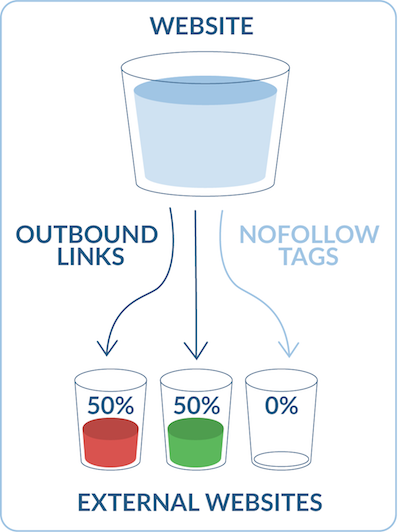
Source: Woorank
Google, however, had discovered the manipulation.
Now, if you add the “nofollow” tags to a backlink, it won’t withhold any juice. Instead, you’ll waste your juice.
The “nofollow-tagged sites” won’t receive the equity, and neither will the “dofollow-tagged sites.”
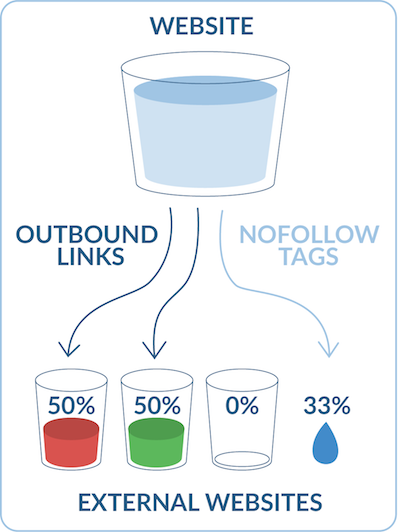
Source: Woorank
So, instead of manipulating Google, stop using “nofollow” tags on your backlinks altogether. Focus on adding more juice to your pages and perfecting your internal linking.
Outside PageRank sculpting, watch out for the following factors to get the most benefits from your link juice.
5 Factors That Affect The Effectiveness Of Link Juice
Page Authority
Obviously, the link juice from a page with low authority will be next to nothing. Who knows, it might not even be enough to drip over to your site.
In essence, the page where you get your links is crucial. The higher the authority of that page, the more chances of channeling its juice to your site — and its effectiveness.
Pro tip:
Link juice from a page that’s actively growing is the best. The higher the authority grows, the more equity will drip down to your page.
Domain Authority
Like page authority, the overall authority of the domain where your links are placed matters. Moreover, the juice from the “domain” is the collective representation of all the pages.
In other words, don’t focus only on page authority. If possible, prioritize the domain authority first.
The higher the domain authority, the more the chances of higher page authority and effective link juice.
Pro tip:
Mozbar is an effective tool for checking the domain authority of pages and domains.
Also read: How To Increase Your Site’s Domain Authority!
Link Position In The Page
It is not enough that your links are placed on a high-authority page or domain. The positions of the anchor text also matter.
If your anchor texts are placed in the sidebar or toolbar, Google might interpret your site as invaluable.
In short, place your anchors within the text. If possible, let them appear higher up in the content.
Number Of Links A Page Sends Out
From the diagrams we shared earlier, you can see that equity is shared equally among outbound links.
So, if a page sends out 4 links, the equity will be 25% for the receiving page.
If that same page sends out only 2 links, the equity would be 50% for the receiving ages.
Deductively, the fewer backlinks on a page, the higher the linking juice the receiver (the target page/site) will receive.
Besides, a page that links to too many pages/sites will attract suspicions. Google bots might interpret it as link farm content.
The only exceptions to the suspicions are resource pages.
Link Relevancy
If your backlinks tick all the boxes but are not from a site that is relevant to yours, their juices might be watered down.
Imagine you’re a link builder who discusses SEO campaigns and tips. Then, you get backlinks from a fitness and weight loss management site.
Is there any relevance between the two industries?
Unless the backlink was placed in case studies or appreciation text, search engine bots won’t recognize it as relevant — let alone pass down any link juice.
Verdict
Link juice/equity should not be ignored. It should be one of the priorities of your SEO campaigns.
But while you’re at it, remember that link juice is just a reward for doing the right things:
- Creating valuable content and linkable assets
- Building relationships with other key actors in your industry
So, focus on doing the RIGHT things. Link juice will come after, and you can pass it around your site with internal linking.
